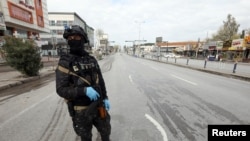Kurdish security forces last week arrested at least eight journalists at a protest in the northern city of Duhok, a move that rights groups say was meant to block coverage of dissent.
The journalists were covering a protest by teachers and government employees who were demanding that regional authorities pay their salaries.
Public workers in the Kurdish region have not been paid for nearly four months because of dropping oil prices and a budget dispute between the Kurdistan Regional Government and the central government in Baghdad, local reports said.
Delayed salaries have been a persistent issue since 2015, triggering protests that Kurdish authorities regularly meet with arbitrary arrests, Belkis Wille, a senior researcher at the New York-based Human Rights Watch, said in a statement.
"Every time there is a crisis, a protest, or some form of social unrest, freedom of the press gets tested in Kurdistan," said Rahman Gharib, a coordinator at the local press freedom group, Metro Center for Journalist Rights and Advocacy.
"The reason they arrest journalists during protests is because security forces engage in human rights abuses and they don't want that to be under camera lenses," Gharib told VOA.
Akram Guli, a reporter with Speda TV, was among those detained on Saturday. He said that the local security forces, known as Asayish, arrested him before he reached the protest.
"Five people approached me, saying that I had to go with them. One of them introduced himself as a member of the Asayish," he told VOA in a phone interview after his release.
"They sent me to Zirka prison. I was put in a prison that holds all sorts of criminals," Guli said.
The journalist said he spent two nights at the prison, where at least 12 other people, including journalists and teachers from the protests, were held.
Speda TV is affiliated with the Kurdistan Islamic Union (KIU), an opposition party in the Kurdish region.
"Once again the Kurdish authorities in northern Iraq have used the laws at their convenience to stamp out news coverage that makes the government uncomfortable," Ignacio Miguel Delgado, the Middle East representative for the Committee to Protect Journalists (CPJ), said in a statement Monday.
The New York-based press freedom group said that the detained journalists work for outlets affiliated with either the KIU or the Patriotic Union of Kurdistan (PUK), another major political party in the autonomous region.
The Kurdish region is ruled by the Kurdistan Democratic Party, which considers Duhok as a traditional stronghold.
Ban on protests
Officials for the Kurdistan Regional Government said that authorities detained 19 journalists and protesters for violating measures that ban mass gatherings during the coronavirus pandemic.
"No protester was wearing masks and gloves, no social distancing measures were implemented, therefore, the Duhok police wanted to dismantle the crowds, but the protesters did not comply," Dindar Zebari, the regional government's coordinator for international advocacy, said in a statement Tuesday.
Zebari declined to comment to VOA on specific cases of detained journalists.
All eight journalists were later released but four of them — Guli, Maher Sakfan, Omed Haji and Ahmed Sharnakhi — were charged under Law 11, which regulates demonstrations, the CPJ said.
Guli said he and the other three journalists were released on $1,680 bail.
Under the law, protesters need a permit from local authorities for mass gatherings. Anyone who violates the law faces up to a month in prison or a fine of up to 500,000 Iraqi dinars ($420).
"All the four journalists were tried under Law 11, instead of the press law," said Ramadhan Artesey, a volunteer lawyer representing Guli.
Kurdistan's press law stipulates that no journalist should be arrested for his or her work.
Coronavirus challenges
Local journalists have faced other challenges while reporting during the coronavirus pandemic, media watchdogs said.
The Health Ministry last month sent a letter to the attorney general requesting that authorities prevent NRT, a news channel affiliated with Shaswar Abdulwahid, head of New Generation Party, from broadcasting.
The request was filed in response to an April 5 NRT report alleging that the regional government had inflated the number of COVID-19 deaths in Iraqi Kurdistan to discourage people from demonstrating, the CPJ reported.
The channel is still broadcasting but the complaint remains open.
Separately, authorities on April 6 detained Zryan Mohamed, a freelance reporter for the independent news website Awene, for several hours over a story claiming that the Sulaymaniyah Chamber of Commerce had failed to implement adequate safety measures for the pandemic, the CPJ said.
Guli said that the risk of arrest makes media in the region cautious. "Journalists in [Kurdistan region] fear everything ... even fear our shadows," he said.




